Site Search
- resource provided by the Forum Network Knowledgebase.
Search Tip: Search with " " to find exact matches.
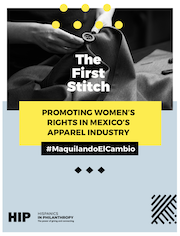
This report from Hispanics in Philanthropy, highlights both the circumstances that women face in the apparel industry and the broader economic environment in which apparel companies operate, which significantly affects how these companies treat their employees. It aims to provide philanthropies that focus on women’s well-being – especially those interested in guaranteeing equitable access to safe and fair work for women – with an innovative example of how they can direct their efforts: supporting projects that directly engage the private sector in examining the causes of injustice and human rights abuses and ultimately ameliorating them.
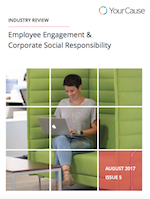
Twice a year, the YourCause team publishes our Industry Review focused on evaluating employee engagement and corporate social responsibility programs. This report uses performance data collected by the YourCause Employee Engagement platform between January and December of 2016. We identify trends, activities and benchmarks in employee engagement and corporate social responsibility. Our clients, industry peers, and other interested parties may use this data as a barometer for performance measurement.
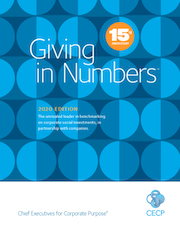
CECP’s Giving in Numbers™is the unrivaled leader in benchmarking on corporate social investments, in partnership with companies. It is the premier industry survey and research, providing standard-setting criteria in a go-to guide that has defined the field and advanced the movement. CECP has the largest and most historical data set on trends in the industry, shared by more than 585 multi-billion-dollar companies over nearly 19 years, representing more than $312 billion in corporate social investments over that time span. The report is embraced by professionals across all sectors globally to understand how corporations invest in society, with topics ranging from cash and in-kind/product, employee volunteerism and giving, and impact measurement.
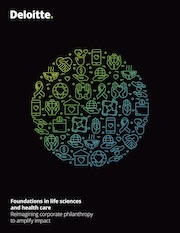
The New Jersey Arts and Culture Recovery Fund has awarded $1.3 million in grants to 68 nonprofits across the state in an effort to help them recover from the devastating effects of the pandemic.
This is the second round of grants awarded by NJACRF, which is hosted by the Princeton Area Community Foundation. Earlier this year, the fund provided $2.6 million in grants to more than 100 other arts, culture and historical nonprofits statewide.
COVID-19 shuttered venues and forced furloughs and layoffs of more than half of the state’s creative workforce. The state’s nonprofit arts industry reported pandemic-related losses of more than $100 million as of December.
In response to the needs of the arts community, NJACRF was established last year with a gift from the Grunin Foundation, based in Toms River. A coalition of funders quickly followed with their support, to ensure the recovery of the industry.
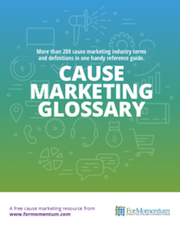
This handy reference tool contains the definitions for over 250 cause marketing industry terms used by savvy businesses and nonprofit organizations. When you meet with partners, whether you are a corporation or a nonprofit, it’s always beneficial to speak their language and show them that you fully understand their marketing landscape. We’ve taken some buzzwords straight from this year’s headlines and added others that have been around awhile but have taken on added importance in 2019.
Philanthropy and the Social Economy: Blueprint 2017 is an annual industry forecast about the ways we use private resources for public benefit.
Foundation Center is pleased to again partner with Lucy to offer the Blueprint as a GrantCraft guide. The Blueprint provides an overview of the current landscape, points to major trends, and directs your attention to horizons where you can expect some important breakthroughs in the coming year.
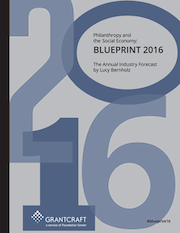
Philanthropy and the Social Economy: Blueprint 2016 is an annual industry forecast about the ways we use private resources for public benefit.
Foundation Center is pleased to again partner with Lucy Bernholz to offer the Blueprint as a GrantCraft guide. The Blueprint provides an overview of the current landscape, points to major trends, and directs your attention to horizons where you can expect some important breakthroughs in the coming year.
The New Jersey Bankers Association’s Charitable Foundation recently announced it will donate $50,000 to the veterans’ programs at four New Jersey colleges: Fairleigh Dickinson University, Monmouth University, Rider University and Rutgers University.
The donations will be awarded in January.
“The New Jersey banking industry has always made giving back, and supporting our local institutions, a priority,” NJBankers CEO John McWeeney said. “Our ongoing support of these valuable programs allows us to recognize those men and women who have volunteered to protect our country in the armed forces.”
CNJG’s Finance and Investment Affinity Group exists to keep foundation executives informed as they manage the investment of their corpus. Growth of foundation assets and the active exchange of sound investment strategies is the focus of each program.
As stewards of your organization’s assets, you’ve likely had discussions at the Board level regarding the merits of incorporating Values-Based Investing (“VBI”) approaches into the investment program. As the industry has evolved, VBI incorporates Socially Responsible Investing, Environmental Social & Governance (“ESG”), and Impact Investing. While the opportunity and investment thesis for capturing VBI attributes are well articulated across the industry, a cautious and thoughtful approach is warranted. VBI should not be “one size fits all”; rather, a customized opportunity exists to reflect your organization’s values across the investment portfolio. Further, given the meteoric rise of VBI across the investment industry, there are a plethora of products that claim to incorporate responsible principles; however, a closer examination may raise doubts about the value-add being provided, especially on a net of fees basis. Lastly, certain VBI arenas such as ESG have unfortunately become a hot-button political issue, with both ends of the spectrum equating ESG investing with other political agendas. When considering the appropriateness of VBI for your organization, we believe it is important for the Board to have a clear understanding of the opportunities and challenges involved.
Agenda
8:30 a.m. - Breakfast
9:00 a.m. - Program begins
10:00 a.m. - Meeting concludes
Cost: $35 for CNJG Members; $70 for Non Member Grantmakers (includes full breakfast)
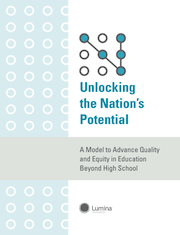
A report from Lumina Foundation and its Quality Credentials Task Force calls for a coordinated national effort to ensure equitable access to quality postsecondary education in the United States.
The report, Unlocking the Nation's Potential: A Model to Advance Quality and Equity in Education Beyond High School (32 pages, PDF), found that the current U.S. system of degrees, certificates, industry certifications, and other credentials lacks a comprehensive definition of quality as well as the kind of up-to-date indicators needed to drive improvements in policies and practices. To help guide efforts that ensure access to high-quality educational opportunities for students of color and advance racially and economically just outcomes, the task force — which includes nearly two dozen education, policy, and workforce development leaders — proposes a model based on a shared understanding of what a quality credential is, as well as institution-based curricular changes and systemic reforms at the federal and state levels.
Confounded by what to do and how to be in your role right now? What does it mean to be focused on a vision of racial equity, well-being, gender justice, economic health when people, institutions, and the systems that have allowed most of us to at least limp along are literally under attack?
With manufactured chaos causing increased threats and real impacts to our safety, our communities face even greater challenges in understanding how and where to strategically invest time, money, and energy. Part presentation and part experiential workshop, this mini-lab led by Change Elemental is designed to meet this moment by supporting us to move in complexity and chaos toward visions of a more just and safer future.
Participants will be invited to learn more about and/or deepen your practice of:
Advancing liberation and sovereignty
Sharing leadership and power
Valuing multiple ways of knowing
Creating space for inner work
Influencing complex systems change
Working with real-life examples, we will dive into what a future of liberation and sovereignty---a future that centers interdependent, whole people and whole communities---looks like and how we might be in support of nonprofits who are actively engaging in the strategies of blocking attacks, building power, cultivating belief, and bridging communities.
Whether you are an evaluator seeking to disrupt existing mental models for evaluating strategy or measuring impact or you're a program officer seeking ways to disrupt power dynamics and build meaningful partnership within the communities you serve, this experience will lead to specific actions for moving effectively with purpose in this moment.
What will I learn?
Session participants will leave with:
New frameworks and ideas for applying them to advance a liberatory future in complexity and chaos
A guiding question and tools to support ongoing experimentation
A taste of what practicing liberation and sovereignty can mean, be, and feel like
A call to support more spaces rooted in being in healthy, continuous, and mutually accountable relationship with self, each other, and the more than human world
Speakers
Aja Couchois Duncan, Senior Consultant, Change Elemental
Elissa Sloan Perry, Director, Prefiguring Futures, Change Elemental
Jess Solomon, Principal, Art in Praxis (former senior program officer, Robert W. Deutsch Foundation)
Trish Adobea Tchume, Vice President, Robert Sterling Clark Foundation
Who should attend?
All interested funders, regardless of roles. What to expect: presentation, practice, followed by panel discussion.
Cost: Free for CNJG Members
Presented by Philanthropy New York
How the government can partner with impact investors to unleash new capital, talent and energy for maximum impact.
The New Jersey Economic Development Authority (NJEDA) today announced that it anticipates awarding $14 million in grants to 27 organizations through its Sustain & Serve NJ program. The NJEDA launched applications for Sustain & Serve NJ in late 2020 to support restaurants that have been negatively impacted by the COVID-19 pandemic. The NJEDA expects that the funding announced today will result in the purchase of 1.5 million meals from at least 160 New Jersey restaurants in at least 69 cities in 12 counties.
“New Jersey’s restaurants were hit particularly hard by the COVID-19 pandemic, and the outpouring of interest in Sustain & Serve NJ underscores the community’s desire to help local restaurants and the neighborhoods they serve,” Governor Phil Murphy said. “The positive economic impact of this program for the restaurant industry, combined with the good it will do in the community, makes Sustain & Serve NJ a home run.”
Through Sustain & Serve NJ, the NJEDA anticipates providing $14 million in grant funding to entities throughout the Garden State to support expenses directly tied to bulk purchasing of meals from New Jersey-based restaurants. Each awardee will receive a grant of between $100,000 and $2 million to fund these purchases. The entities will then distribute the meals at no cost.
Advancing its ongoing commitment to ensuring a stable and healthy cultural industry, the New Jersey Cultural Trust Board approved a total of $798,395 in grants supporting capital projects at 21 nonprofit cultural organizations during an open public meeting held virtually Dec. 15. The nearly $800,000 in awards represents the largest total dollar amount the board has approved in grant awards in a single fiscal year since 2011.
With the FY2024 grant awards, the Cultural Trust has now awarded over $10.4 million in funding for historic preservation and financial stabilization projects across New Jersey to date.
“These grants are investments in the sustainability and longevity of sites significant to our state’s rich and diverse history,” Lt. Gov. Tahesha Way, who oversees the Cultural Trust in her capacity as secretary of state, said. “New Jersey’s historic places are essential to our state’s identity and culture, and the Cultural Trust’s Capital Historic Preservation program helps safeguard them for future generations.”
Community foundations are beginning to deepen and shift how they work, adopting an anchor mission that seeks to fully deploy all resources to build community wealth. Moving into territory relatively uncharted for community foundations, they are taking up impact investing and economic development — some in advanced ways, others with small steps. This report offers an overview of how 30 representative community foundations — including The Seattle Foundation, the Vermont Community Foundation, and the Greater Cincinnati Foundation — are working toward adopting this new anchor mission.
This Democracy Collaborative report was written by Marjorie Kelly, Senior Fellow and Director of Special Projects and Violeta Duncan, Community Development Associate.
